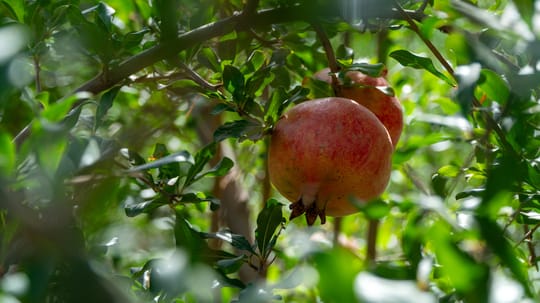The Sublime Pomegranate: How One Fruit Cultivates Culture, Community, and Change

In the heart of Morocco’s High Atlas Mountains, amidst the sun-drenched landscapes and dry terrains, lies a historic treasure revered for millennia: the pomegranate. As the past month has now come to an end, November marked the yearly celebration of International Pomegranate Month—a time when this crimson fruit takes center stage, not just as a culinary delight but as a symbol of hope, nourishment, and economic revival for the farmers of High Atlas Foundation.
An emblem of vitality, pomegranates are round, hard fruits with shiny yellow-red skins. The fruit is composed of jewel-like inner seeds, known as arils, that people can eat either raw or juiced. Not only is the fruit delicious, it also contains numerous ageless health benefits within its core. The founding director of UCLA’s Center for Human Nutrition, Dr. David Heber, reveals this wealth of benefits by highlighting how the pomegranate contains the largest and most potent polyphenol antioxidant known. From anti-inflammatory properties, to supporting the gut microbiome, while also functioning as a natural internal sunscreen, the pomegranate emerges as a true holistic elixir.
However, its significance extends far beyond individual wellness—it weaves into the very cultural fabric of Morocco. The lush arils of the pomegranate find their way into local recipes, infusing dishes like the aromatic lamb or chicken tagine with a harmony of sweetness and tanginess that has been enjoyed for generations. Its vivid red color also often signifies vitality and is frequently incorporated into art, textiles, and even architectural designs, further cementing its significance within Moroccan culture as a motif of beauty, well-being, and the fertility of the land.
Yet, amidst this cultural richness lies a deeper narrative—a story of empowerment and transformation for the farmers here at the High Atlas Foundation. Embracing sustainable practices, these farmers cultivate the golden pomegranate variety, embodying an organic and non-GMO ethos that stands as a testament to their commitment to both tradition and innovation.
Their journey is one of resilience and ambition. Encountering challenges like peel bursting, they sought counsel, determined to uphold their farming heritage while improving their practices. Collaboratively, alongside HAF’s Farmer to Farmer program, a vision emerged—a business plan to extract and bottle the essence of the fruit. It wasn't merely about juice; it was about forging a path towards economic prosperity.
The plan depicted a canvas of opportunity rather than just profitability. The farmers knew that if they were to move towards value-added processing, their returns would significantly increase. Such an operation would also not only generate employment for youth, but it envisioned a robust international marketing endeavor that introduced the world to the untapped potential of Moroccan Golden pomegranates.
A marketing survey unveiled the latent desire for pomegranate juice beyond the three-month harvest period from September to November. This realization kindled a spark of possibility—the farmer’s cooperative was ready to quench the people’s thirst for clean, pure pomegranate juice year-round, not just within Morocco but also on international shores. The farmers’ cooperative thus hired a small cadre of skilled young women and men to aid in the effective implementation of this pomegranate processing program. This includes a marketing manager, an accountant, an information and computer specialist, a mechanical engineer and an administrative assistant.
The seeds of the proposal have already found fertile ground, attracting donors eager to continue nurturing this vision into fruition. With their support, the cooperative strides confidently towards a future where their premium pomegranate juice adorns shelves worldwide, enriching lives and communities, while honoring a legacy deeply rooted in Moroccan soil.
The journey from pomegranates to pomegranate juice isn't just a tale of transformation—it's one of resilience, culture, and hope. It's a testament to the enduring spirit of rural farmers, the richness of Moroccan heritage, and the infinite possibilities that arise when tradition meets innovation.
Currently, the High Atlas Foundation tends to 118,906 pomegranate saplings distributed across our nurseries in various provinces. Our commitment to planting pomegranates extends through ongoing projects like the Multicultural Cooperation for Fruit Tree Planting initiative, and the Tree Planting for Farming Families project. As the International Pomegranate Month has faded into December, its legacy lives on as a reminder that a single fruit has the capacity to heal bodies, enhance societies, and foster ripe futures.
If you are captivated by the power of the pomegranate and wish to branch out its impact by helping recent earthquake-affected farming families in Morocco—who are essential to deeply embedding the cultural, religious, and economic roots of this fruit—consider supporting a community project on GlobalGiving:
● Multicultural Cooperation for Fruit Tree Planting
● Plant Trees to Empower Farming Families in Morocco
Sneha Khan and Smita Mahmud, fourth-year students of International Development Studies from the University of Toronto, are currently interning at the High Atlas Foundation in Marrakech, Morocco.